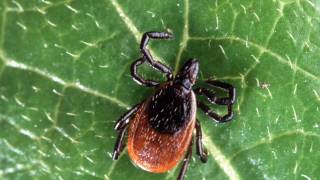Powassan Virus Vaccine Candidate Discovered at Washington University School of Medicine

A group of researchers from Washington University School of Medicine has developed a vaccine candidate that is effective in mice against the Powassan virus.
In mice, the new vaccine candidate was effective after 1 dose against 2 different strains of Powassan virus, and against the more distantly related Langat virus.
This new study showed that the vaccine produces antibodies that can protect the mice against other, related tick-transmitted flaviviruses.
Powassan virus is a neurovirulent flavivirus consisting of 2 lineages causing herpes meningoencephalitis. It is the only member of the tick-borne encephalitis serogroup which is present in mainland North America.
If you have viral meningitis, symptoms may include fever, light sensitivity, headache, and a stiff neck. If you have other symptoms, such as confusion, seizures, sleepiness, or a focal neurologic deficit—a nerve function problem that affects a specific area — these may suggest that your brain is also affected, and your healthcare provider may diagnose it as encephalitis.
Powassan infection is transmitted by different tick species in different geographical regions.
A total number of 98 cases were reported from 1999 to 2016.
This new vaccine candidate is based on a vaccine platform that these researchers used to develop a potential vaccine for Zika.
mRNA from the virus in question, encapsulated in lipid nanoparticles (LNP), produces subviral particles that share many features of the virus and provoke an immune reaction that produces protective antibodies.
This work suggests that the LNP-encapsulated modified mRNA vaccine platform could be used to produce vaccine candidates for other flaviviruses by substituting in mRNA from the virus the researchers want to target.
"We are excited that this mRNA-based vaccine against Powassan virus was highly immunogenic and conferred protection against multiple members of the family,” said Michael S. Diamond, MD, Ph.D., in a press release.
“We plan to continue studying the molecular basis for its broadly neutralizing antibody activity and test the vaccine against additional related viruses," said Dr. Diamond.
This research was supported by NIH-NIAID and a research grant from Moderna.
No conflicts of interest were disclosed.
Our Trust Standards: Medical Advisory Committee



